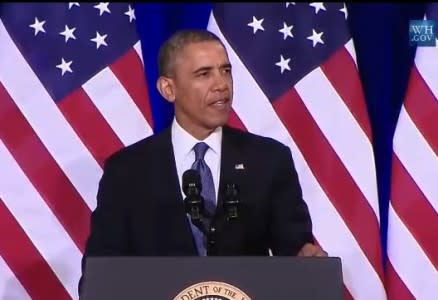The president as emperor? The current executive power debate
Has President Obama exceeded his constitutional power as president? Or have the president’s actions mirrored those of other past leaders? Here’s a look at the book that started the Imperial Presidency debate, back in 1973, and some ideas from its author.
The discussion over President Obama’s use (or non-use) of executive power over everything from the Affordable Care Act to the lethal use of drones on American citizens hit a new high this week, as leading Republicans picked the concept of the “imperial presidency” as a battle cry for the 2014 mid-term elections.
As this debate unfolds, Constitution Daily went back to Arthur M. Schlesinger Jr.s’ influential book, The Imperial Presidency, and some of his later writings to see what he thought made an imperial president so imperial.
The late eminent historian, a Democrat, was focused on the war-making and foreign policy powers of the president, which he said became obvious back in 1798 when President John Adams dealt with the prospect of war with France with the origination of the Alien and Sedition Acts.
Schlesinger warned in 1973 that the American political system was threatened by “a conception of presidential power so spacious and peremptory as to imply a radical transformation of the traditional polity.”
The 1973 book focused on the administration of President Richard Nixon and past presidents. Subsequent versions of the book dealt with newer administrations, too.
In a 1987 article for the New Republic, Schlesinger looked back at the book and summarized its key concepts.
“My argument then, as now, was that the American Constitution intends a strong presidency within an equally strong system of accountability. My title referred to what happens when the constitutional balance between presidential power and presidential accountability is upset in favor of presidential power,” he said.
Schlesinger cited Abraham Lincoln as an example of a president who wielded imperial power at times, citing a famous quote from William Seward: “We elect a king every four years and give him absolute power within certain limits, which after all he can interpret for himself.”
He believed the roots of the modern imperial power debate were in the origins of World War II.
“Since Pearl Harbor, however, Americans have lived under a conviction of international crisis, sustained, chronic, and often intense. The imperial presidency, once a transient wartime phenomenon, has become to a degree institutionalized,” he said back in 1987.
“Presidents Truman, Johnson, Nixon, and Reagan thereafter assumed that the power to send troops into combat is an inherent right of the presidency and does not require congressional authorization,” Schlesinger said.
One example he cited, which we saw in last year’s debate over military intervention in Syria, was the power of the president to send the military into harm’s way with prior congressional authorization. In 1987, the examples were interventions in Grenada and Lebanon.
“The Constitution has never pretended to guarantee against presidential incompetence, folly, stupidity, or criminality. But through the separation of powers, it can guarantee that, when a president abuses power, corrective forces exist to redress the constitutional balance,” he concluded.
In his later years, Schlesinger strongly objected to some Bush administration policies after the 9/11 terrorist attacks, including the interrogation of prisoners at Guantanamo Bay.
“It all began in 1798 with the Alien and Sedition Acts. The Federalists would have been better advised to call these obnoxious statutes the Patriot Acts, but the conservatives of 1798 were innocent of the fine art of public relations,” he wrote in a letter to the New York Times in 2004.
Today’s debate about President Obama’s use of executive powers touches on different subjects. In one area, President Obama’s critics cite the failure of the administration to defend the Defense of Marriage Act as a breach of presidential powers, since the Justice Department refused to defend a law passed by Congress.
Even that event has a precedent. In 1868, President Andrew Johnson fired his War Secretary despite the existence of a law, passed over his veto, that barred such an act without congressional approval. So in essence, Johnson didn’t enforce the act by violating it himself.
Johnson was impeached for his actions and survived a Senate trial. Years later, the Supreme Court ruled in a related case the act was invalid.
Another objection is President Obama’s use of executive orders to make policy. For example, at his 2014 State of the Union address, the president announced a series of orders to raise the minimum wage for federal employees and make pension-system changes.
That didn’t worry some who supported the moves.
“We all learned in school that the founders feared executive power and so gave policy-making authority to Congress. In fact, the founders feared a too-powerful Congress as well, and they sought to create a strong executive. But the idea that Congress makes law and the president executes it—and any deviation from this pattern is tyranny—is burned into our political culture,” said Eric Posner, a University of Chicago law professor.
But others saw the executive orders as the latest in a series of Obama power grabs. In a Wall Street Journal op-ed called “The Imperial Presidency of Barack Obama,” Senator Ted Cruz said, “The president’s taste for unilateral action to circumvent Congress should concern every citizen, regardless of party or ideology.”
Cruz quoted the 18th-century political philosopher Montesquieu as what the Founding Fathers took to heart: “There can be no liberty where the legislative and executive powers are united in the same person, or body of magistrates.”
Scott Bomboy is the editor in chief of the National Constitution Center.
Recent Constitution Daily Stories
Constitution Check: Do college athletes have a right to be paid a salary?
Man successfully argues the Fifth in deer killing case
The conflict between rap lyrics and the First Amendment
A constitutional look at how Obamacare made it to today’s historic deadline



